After returning from a visit to Bali, Indonesia,
several people asked me if the island was as pretty and desirable to visit as
it seems from pictures. Certainly, we didn’t see every part of the island, but
over the course of several days, Larry and I did enjoy different and distinct areas ranging from south to
north.Beach at the Ritz Carlton Hotel in Bali
Bali often ranks among the best island destinations
in the world, according to numerous travel sites. It’s a province of Indonesia
and part of the largest archipelago in the world (although one of the smallest
islands). It’s part of the Coral Triangle, an area with the highest
biodiversity of marine species. In addition to beaches and an idyllic setting
most people expect to see, icons of the culture and a topography that ranges
from sea level to mountains make Bali a desirable place to visit.Beautiful scenery along cliff paths
Nusa
Dua district
is located at the southern tip of the island. It is home to many high-end
hotels built on land that was not suitable for growing rice or other
agriculture. Driving around this district one sees beautiful sandy beaches—I decided
to wade in to feel the warm, welcoming waves--lush vegetation, Hindu temples, and
monkeys.
Away from the seaside hotels, the land is very rugged with rocky ledges and emerald cliffs. Uluwatu Temple, which is built on a cliff, captured that scene well.Beverly splashing in the ocean
After a lunch of chicken satay and Bintong beer, the
local brew, we drove to Padang Padang beach, a secluded but popular spot that
has been featured in movies.
Getting down to the water required walking down
steep steps through a cave, but plenty of people had found their way.Larry wades into
Padang Padang beach.
Late afternoon we visted the GWK (Garuda Wisnu
Kencana) Cultural Park, where we watched an outdoor music and dance program
honoring Garuda, an eagle-like creature in Hindu mythology with human features. Garuda transported the god Wisnu
of Hindu mythology.
Garuda transported the god Wisnu who descended to earth in different
manifestations. Garuda symbolizes the virtues of knowledge, power, bravery,
loyalty and discipline and is honored with a statue that is 248 feet high.
Our
cultural journey from south to north began with a
performance of traditional dance and music at Barong Tanah Kilap. Bali is
renowned for its strong belief in keeping traditions alive, so children are taught
to play ancient instruments and perform dances that tell stories of the
culture.
The temple at Tanah Lot on the southwestern coast of
Bali is remarkable because it is built on rocks in the sea. Here we saw the
first of many “gate” structures, which have become popular picture spots for
tourists. Driving northward towards the middle of the island, we came to
Jatiluwuh, an area famous for massive rice fields terraced on hillsides.
Fortunately, the rice was green and lush, so we marveled at beautiful scenes while
enjoying a typical Indonesian lunch there.Dancers represent mythical figures in Bali's culture. Terraced rice fields at Jatiluwuh Gate structures are common.
We were headed to the mountains for a waterfall hike
next, but heavy rain changed those plans. Instead, we stopped at the Floating
Temple on Lake Bratan. The temple is only accessible at low tide when boulders
leading to it are exposed. This lake is fresh water in what once was a volcanic
crater. There is a lovely garden and park surrounding Lake Bratan and plenty of
things for families to do. Three worship centers—Hindu and Buddhist temples and
a Mosque—are located in the park.Temple at Tanah Lot is built on ricks in the sea.
On the way back to our hotel in Nusa Dua, we stopped
at Tegal Sari, a coffee plantation where we sampled many different teas, all
made from natural ingredients grown there. I also drank a cup of Kopi Luwak,
the world’s most expensive coffee that
is made from the poop of the cat-like civit.
Badung
Market, a traditional open-air market in Bali, is a
different concept from supermarkets in the U.S. There is no air conditioning or
refrigeration for meat or fish, fruits or vegetables, or even prepared foods
that are sold by individuals. But it’s a very busy place since locals shop
daily. In Denpasar, the capital of Bali, we visited the Bajra Sandhi Monument,
Museum Bali, and Jagatnatha Temple.You can find almost everything at the Badung Market Bajra Sandhi Monument in Denpasar, Bali
Lastly, we ended up at Singaraja, a provincial
capital that was once under Dutch colonial rule, on the northwest shore of the Bali
Sea. In the countryside we visited a farm near Bengkel village. Here the
fertile volcanic soil is great for growing organic produce and medicinal herbs,
as well as rice, a staple that has been harvested from terraces for 2,000
years. Larry samples an herbal tea and
medicinal herbs
From an elevated outlook, we gazed out over Tamblingen and Danau Buyan
lakes, had lunch in the Munduk area, and made friends with a couple we’ve since
visited with in Texas.
All of these sights helped us understand the allure
of Bali for tourists and a new breed of digital nomads, young people who chose
to live and work there for months or years because the cost of living is
relatively cheap.Lakes near the northwest shore of the Bali Sea.
Is Bali worth visiting? Yes, just as every place on
earth is worth visiting for its own unique characteristics. We’re glad to had
had the opportunity to spend several days there.

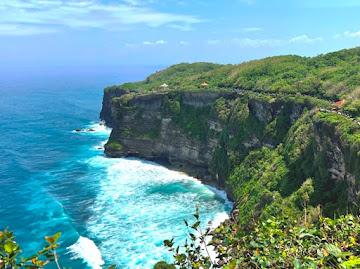
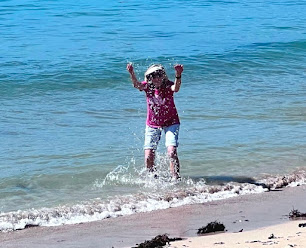




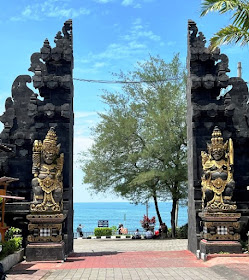

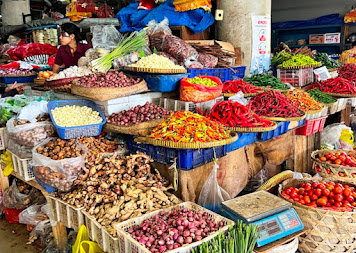

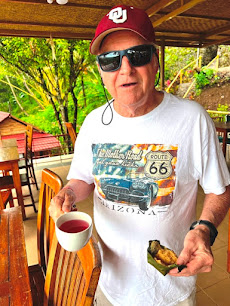
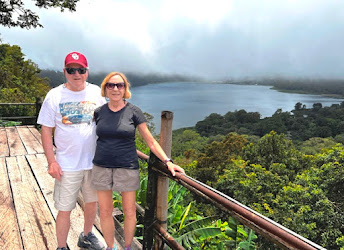








No comments:
Post a Comment